Social Democratic and Labour Party
The Social Democratic and Labour Party (SDLP) (Irish: Páirtí Sóisialta Daonlathach an Lucht Oibre)[9] is a social-democratic[6][10][11] and Irish nationalist[10][12][13] political party in Northern Ireland. The SDLP currently has eight members in the Northern Ireland Assembly (MLAs) and two Members of Parliament (MPs) in the House of Commons of the United Kingdom.
Social Democratic and Labour Party Páirtí Daonlathach Sóisialta agus an Lucht Oibre[1] | |
|---|---|
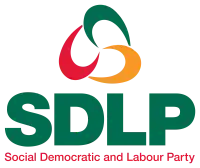 | |
| Abbreviation | SDLP |
| Leader | Colum Eastwood |
| Deputy Leader | Nichola Mallon |
| Chairperson | Colin McGrath |
| Party Manager | Catherine Matthews |
| Founders |
|
| Founded | 21 August 1970[2] |
| Headquarters | 121 Ormeau Road Belfast BT7 1SH[3] |
| Youth wing | SDLP Youth |
| Women's wing | SDLP Women |
| LGBT wing | SDLP LGBT+ |
| Ideology |
|
| Political position | Centre-left[6][7] |
| European affiliation | Party of European Socialists |
| International affiliation | Socialist International |
| Colours | Green Red |
| House of Commons (NI seats) | 2 / 18 |
| NI Assembly | 8 / 90 |
| Local government in Northern Ireland[8] | 56 / 462 |
| Website | |
| www | |
| |
The SDLP party platform advocates Irish reunification[4] and further devolution of powers while Northern Ireland remains part of the United Kingdom. During the Troubles, the SDLP was the most popular Irish nationalist party in Northern Ireland, but since the Provisional IRA ceasefire in 1994, it has lost ground to the republican party Sinn Féin, which in 2001 became the more popular of the two parties for the first time. Established during the Troubles, a significant difference between the two parties was the SDLP's rejection of violence, in contrast to Sinn Féin's then-support for (and organizational ties to) the Provisional IRA and physical force republicanism.
History
Foundation and early history
The party was founded in August 1970, when six Stormont MPs and one Senator, former members of the Republican Labour Party (a party with ties to the Irish Labour Party), the National Democratic Party (NDP, a small nationalist party that dissolved itself after the foundation of the SDLP),[14] individual nationalists, former members of the Nationalist Party and members of the Northern Ireland Labour Party, joined to form a new party.
The SDLP initially rejected the Nationalist Party's policy of abstentionism and sought to fight for civil rights within the Stormont system. However, the SDLP quickly came to the view that Stormont was unreformable, and withdrew from parliamentary involvement.
After the abolition of the Parliament of Northern Ireland, the SDLP emerged as the second-largest party, and the largest party representing the nationalist community, in elections to the new Northern Ireland Assembly established in 1973: the party won 19 out of 75 seats. The SDLP was one of the parties involved in the negotiations that resulted in the Sunningdale Agreement, which in turn resulted in the establishment of a power-sharing executive in January 1974. Gerry Fitt, the SDLP party leader, took office as deputy chief executive, taking government alongside the Ulster Unionist Party (led by Brian Faulkner) and the Alliance Party. The Assembly and Executive were short-lived, however, collapsing after only four months due to sustained opposition from within the unionist community regarding the role being given to the Irish government in terms of Northern Ireland: it was to be 25 years before the party sat in government again.
Good Friday Agreement and return to government
The SDLP was a key player in the talks throughout the 1990s that led to the signing of the Good Friday Agreement in 1998.[15] John Hume won a Nobel Peace Prize that year with Ulster Unionist Party leader David Trimble in recognition of their efforts.[16]
As a result of the Agreement, elections to a new Northern Ireland Assembly were held in June 1998; the SDLP emerged as the second-largest party overall, and the largest nationalist party, with 24 out of 108 seats.[17] The party was then returned to government later in the year when a power-sharing Executive was established for Northern Ireland. The SDLP took office alongside the Ulster Unionist Party (UUP), the Democratic Unionist Party (DUP), and Sinn Féin, and the SDLP's Seamus Mallon became Deputy First Minister alongside the UUP's First Minister, David Trimble.[18]
Upon Mallon's retirement in 2001, Mark Durkan succeeded him as Deputy First Minister.
All-island Merger
There had been a debate in the party on the prospects of amalgamation with Fianna Fáil.[19] Little came of this speculation and former party leader, Margaret Ritchie, rejected the idea. Speaking at the 2010 Irish Labour Party national conference in Galway she said that a merger would not happen while she was leader – "Merger with Fianna Fáil? Not on my watch."[20] After his election as Fianna Fáil Leader in January 2011, Micheál Martin repeatedly dismissed the possibility of a merger or electoral alliance with the SDLP. In January 2019, the SDLP membership were e-mailed on the issue with the text "continuing on as normal is not an option", a reference to the party's declining fortunes.[21]
In February 2019, at a special party conference, the members approved a partnership with Fianna Fáil,[22] the main opposition party in the Republic of Ireland. Both parties shared policies on key areas including addressing the current political situation in Northern Ireland, improving public services in both jurisdictions of Ireland, such as healthcare and education, and bringing about further unity and co-operation of the people on the island and arrangements for a future poll on Irish reunification.[23]
Claire Hanna, MLA for Belfast South and party spokesperson on Brexit, quit the assembly group as a result.[24]
In the lead up to the 2022 Assembly election, party leader Colum Eastwood played down the partnership stating, "The SDLP stands on its own two feet."[25] This led people to commentate that the partnership is no longer active, with comments from as early as 2020 determining that it had been "quietly forgotten".[26][27][28] The partnership officially ended on 28 September 2022.[29]
Westminster Parliament
In contrast to Sinn Féin, which follows a policy of abstentionism, the SDLP MPs have always taken their seat in the Westminster parliament. The party's first MP was its leader Gerry Fitt who was already a sitting MP when the SDLP was founded.[30] The SDLP's best result was in 1992 general election when they won four out of 17 seats. Its worst result was in 2017 when they lost all their seats. In 2019 they won two seats.
Although not abstentionist, SDLP MPs have protested the parliamentary oath required of every member of parliament. At the swearing in ceremony after the 2019 general election, the party leader Colum Eastwood said:
- "Under protest and in order to represent my constituency, I do solemnly, sincerely and truly declare and affirm that I will be faithful and bear true allegiance to Her Majesty Queen Elizabeth, her heirs and successors, according to law. My true allegiance is to the people of Derry and the people of Ireland."[31]
Proposed Dáil participation
The SDLP, along with Sinn Féin, have long sought speaking rights in Dáil Éireann, the lower house of the Republic's parliament. In 2005, Taoiseach Bertie Ahern, leader of Fianna Fáil, put forward a proposal to allow MPs and MEPs from Northern Ireland to participate in debates on the region. However, the plan was met with vociferous opposition from the Republic's main opposition parties, Fine Gael and the Labour Party, and was subsequently shelved.[32] Unionists had also strongly opposed the proposal.
Remembrance Day 2010
On Remembrance Day in 2010, party leader Margaret Ritchie became the first leader of a nationalist party to wear a poppy while attending a wreath-laying ceremony in Downpatrick, County Down. The poppy is worn on the lapel in the United Kingdom as a mark of respect and remembrance for fallen British soldiers in the period around Remembrance Day and is controversial in Northern Ireland, as it is viewed by many as a political symbol representing support for the British Army.[33] Because of this, it has long been the preserve of the unionist/loyalist community.[34] Her actions drew praise from unionists.[35][36][37]
Leadership challenges and elections, 2011–2015
On 27 July 2011, it was reported that Margaret Ritchie faced a leadership challenge from deputy leader Patsy McGlone.[38] The Phoenix reported that only one MLA, Alex Attwood was prepared to back her and that "she will be humiliated if she puts her leadership to a vote".[39]
Alasdair McDonnell was confirmed as Ritchie's successor after the subsequent leadership election on 5 November 2011.[40]
Colum Eastwood challenged McDonnell and replaced him as leader after the party's 2015 leadership election.[41]
Ideology and policies
The SDLP is a social democratic party that opposes austerity and Brexit.[42] It is also an Irish nationalist party advocating for a shared home place for all the people on the island of Ireland.[43]
While the party is officially anti-abortion it does not apply a party whip on the issue.[44] The party supports LGBTQ+ rights including marriage equality, the roll out of PrEP across Northern Ireland and LGBT education in schools. The SDLP is anti-xenophobic and opposes plans to create what it deems a hostile environment for immigrants.[45] The party also supports an Irish language act.[46]
The SDLP believes that 3,000 social and affordable houses should be built every year. They oppose the gig economy and zero-hour contract.[47] The party opposes welfare reform and the cut to universal credit.[48][49]
Despite opposing academic selection the party does not advocate the abolition of grammar schools.[50] The party supports the abolition of tuition fees. It wants to make a modern language up to GCSE and the teaching of maths up to the age of 18 compulsory.
The party believes that the Magee campus in Derry should be expanded to 10,000 student places.[51]
The party supports a green corporate levy on businesses who contribute large amounts of greenhouse gases and a green jobs strategy. They also believe that a climate emergency should be declared and the government should be required to reach net zero emissions.[52]
Leadership
Colum Eastwood is the sixth leader of the SDLP, taking over from Alasdair McDonnell in 2015.
Leader
| No. | Portrait | Leader | Period | Constituency |
|---|---|---|---|---|
| 1 | Gerry Fitt | 1970–1979 | MP (Parliament of Northern Ireland) for Belfast Dock (1962–1972) MP (UK Parliament) for Belfast West (1966–1983) | |
| 2 | .jpg.webp) |
John Hume | 1979–2001 | MP for Foyle (1969–1972) MEP for Northern Ireland (1979–2004) MP for Foyle (1983–2005) MLA for Foyle (1998–2000) |
| 3 |  |
Mark Durkan | 2001–2010 | MLA for Foyle (1998–2010) MP for Foyle (2005–2017) |
| 4 |  |
Margaret Ritchie | 2010–2011 | MLA for South Down (2003–2012) MP for South Down (2010–2017) |
| 5 | 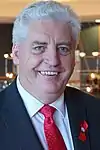 |
Alasdair McDonnell | 2011–2015 | MLA for Belfast South (1998–2015) MP for Belfast South (2005–2017) |
| 6 |  |
Colum Eastwood | 2015–present | MLA for Foyle (2011–2019) MP for Foyle (from 2019) |
Deputy leader
| No. | Portrait | Leader | Period | Constituency | Leader |
|---|---|---|---|---|---|
| 1 | 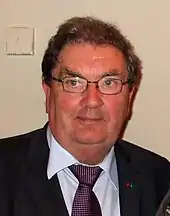 |
John Hume | 1970–1979 | MP for Foyle (1969–1972) MEP for Northern Ireland (1979–2004) MP for Foyle (1983–2005) MLA for Foyle (1998–2000) |
Gerry Fitt |
| 2 |  |
Seamus Mallon | 1979–2001 | MP for Newry and Armagh (1986–2005) MLA for Newry and Armagh (1998–2003) |
John Hume |
| 3 | 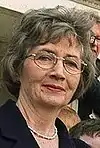 |
Bríd Rodgers | 2001–2004 | MLA for Upper Bann (1998–2003) | Mark Durkan |
| 4 |  |
Alasdair McDonnell | 2004–2010 | MLA for Belfast South (1998–2015) MP for Belfast South (2005–2017) | |
| 5 |  |
Patsy McGlone | 2010–2011 | MLA for Mid-Ulster (from 2003) | Margaret Ritchie |
| 6 |  |
Dolores Kelly | 2011–2015 | MLA for Upper Bann (2003–2016; 2017-2022) | Alasdair McDonnell |
| 7 | Fearghal McKinney | 2015–2016 | MLA for Belfast South (2013–2016) | Colum Eastwood | |
| 8 | 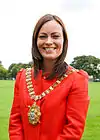 |
Nichola Mallon | 2017–present | MLA for Belfast North (2016-2022) |
Elected representatives
The SDLP currently have two MPs in the UK Parliament, eight MLAs in the Northern Ireland Assembly and 56 councillors across Northern Ireland's 11 councils.[53]
Northern Ireland council seats | |
|---|---|
| Antrim and Newtownabbey Borough Council | 4 / 40 |
| Ards and North Down Borough Council | 1 / 40 |
| Armagh City, Banbridge and Craigavon Borough Council | 6 / 41 |
| Belfast City Council | 6 / 60 |
| Causeway Coast and Glens Borough Council | 4 / 40 |
| Derry City and Strabane District Council | 10 / 40 |
| Fermanagh and Omagh District Council | 5 / 40 |
| Lisburn and Castlereagh City Council | 3 / 40 |
| Mid and East Antrim Borough Council | 1 / 40 |
| Mid Ulster District Council | 5 / 40 |
| Newry, Mourne and Down District Council | 11 / 41 |
MPs
| MP | Constituency | Period | Notes |
|---|---|---|---|
| Colum Eastwood | Foyle | 2019–present | SDLP Leader; Spokesperson for a New Ireland; Foyle MLA 2011–2019 |
| Claire Hanna | Belfast South | 2019–present | Spokesperson for Europe and International Affairs; Belfast South MLA 2015–2019 |
MLAs
| MLA | Constituency | Period | Notes |
|---|---|---|---|
| Mark H. Durkan | Foyle | 2011–present | Spokesperson for Climate Change and Infrastructure |
| Cara Hunter | East Londonderry | 2020–present | Spokesperson for Children and Young People |
| Daniel McCrossan | West Tyrone | 2015–present | Spokesperson for Social Justice |
| Patsy McGlone | Mid Ulster | 2003–present | Assembly Deputy Speaker; Spokesperson for Rural Communities |
| Colin McGrath | South Down | 2016–present | SDLP Chairperson; Spokesperson for Health and Wellbeing |
| Sinead McLaughlin | Foyle | 2020–present | Spokesperson for Jobs, the Economy and Justice |
| Justin McNulty | Newry and Armagh | 2016–present | Spokesperson for Reconciliation and Sport |
| Matthew O'Toole | Belfast South | 2020–present | Leader of the Opposition; Spokesperson for the Cost of Living Crisis |
Other Spokespeople
| Councillor/Representative | District | DEA | Notes |
|---|---|---|---|
| Cllr. Joe Boyle | Ards and North Down | Ards Peninsuala | Spokesperson for Rural Transport |
| Cllr. Pete Byrne | Newry, Mourne and Down | Slieve Gullion | Spokesperson for All-Island Rail |
| Charlotte Carson | Spokesperson for Curriculum Reform | ||
| Cllr. Laura Devlin | Newry, Mourne and Down | The Mournes | Spokesperson for Tourism and Hospitality |
| Paul Doherty | Spokesperson for Ending Poverty | ||
| Cllr. Adam Gannon | Fermanagh and Omagh | Erne West | Spokesperson for Education Reform |
| Cllr. Simon Lee | Lisburn and Castlereagh | Castlereagh South | Spokesperson for Active Travel |
| Cllr. Roisin Lynch | Antrim and Newtownabbey | Antrim | Spokesperson for Rural Isolation and Loneliness |
| Cllr. Dónal Lyons | Belfast | Balmoral | Spokesperson for Heritage, Culture and Arts |
| Cllr. Kerri Martin | Mid Ulster | Cookstown | Spokesperson for Community Integration |
| Cllr. Johnny McCarthy | Lisburn and Castlereagh | Lisburn North | Spokesperson for Justice Reform |
| Cllr. Paul McCusker | Belfast | Oldpark | Spokesperson for Housing and Homelessness |
| Cllr. Gary McKeown | Belfast | Botanic | Spokesperson for Climate Emergency and Net Zero |
| Cllr. Margaret Anne McKillop | Causeway Coast and Glens | The Glens | Spokesperson for Rural Opportunities |
| Cllr. Thomas O'Hanlon | Armagh City, Banbridge and Craigavon | Armagh | Spokesperson for Cross-Border Business |
| Cllr. Grainne O'Neill | Armagh City, Banbridge and Craigavon | Armagh | Spokesperson for Mental Health |
| Cllr. Malachy Quinn | Mid Ulster | Torrent | Spokesperson for Regional Investment |
| Cllr. Ashleen Schenning | Causeway Coast and Glens | Limavady | Spokesperson for Training and Skills |
| Cllr. Gareth Sharvin | Newry, Mourne and Down | Downpatrick | Spokesperson for Equalities |
| Cllr. Brian Tierney | Derry City and Strabane | Ballyarnett | Spokesperson for University Expansion |
| Cllr. Ciaran Toman | Armagh City, Banbridge and Craigavon | Lurgan | Spokesperson for Tackling Paramilitarism |
| Deirdre Vaughan | Spokesperson for Fair Childcare | ||
| Cllr. Carl Whyte | Belfast | Castle | Spokesperson for Health Service Reform |
| Cllr. Ryan Wilson | Antrim and Newtownabbey | Airport | Spokesperson for Fair Work |
Electoral performance
Upon its formation, the SDLP quickly established itself as the second largest party and the largest nationalist party in Northern Ireland. It largely held this position until the beginning of the 21st century. In the 1998 Assembly election, it became the biggest party overall in terms of votes received and the first nationalist party to do so. This would be the largest seat share it would ever hold as it slowly saw declining support following the retirement of John Hume in 2001.
Under leader Mark Durkan, the 2001 general election and the 2003 Assembly election saw fellow Irish nationalist party Sinn Féin win more seats and votes than the SDLP for the first time, a position they would continue to hold. In the 2004 European elections, Hume stood down and the SDLP failed to retain the seat he had held since 1979, losing it to Sinn Féin. Alban Maginness attempted to take the seat again in the 2009 European elections the party fielded as their candidate and failed to gain a seat with 78,489 first preference votes.[54] The party further declined in the 2011 Assembly elections and the 2016 Assembly election, as the total number of votes received continued to drop.
The 2017 Assembly election saw the party retain its 12 seat count from the prior election, increasing its seat share due to a drop in the size of the assembly for the first time since 1998. This was followed by the 2017 general election where the SDLP lost all three seats and returned its worst ever vote share. In the 2019 European election, the final in the United Kingdom's history, party leader Colum Eastwood ran, increasing his party's vote but failing to take a seat. In the general election later that year the party recaptured Belfast South and Foyle with the highest ever vote recorded for the party in both constituencies and managed to increase its vote across Northern Ireland to its highest in almost fifteen years for a general election. The two seats held by the party currently have the largest majorities of any constituencies in Northern Ireland.
In the 2022 Assembly election, the SDLP slipped to the 5th largest party with only eight seats in the Assembly.[55]
Some see the SDLP as first and foremost a party now representing Catholic middle-class interests, with voters concentrated in rural areas and the professional classes, rather than a vehicle for Irish nationalism. The SDLP reject this argument, pointing to their strong support in Derry and their victory in South Belfast in the 2005 election. Furthermore, in the lead up to the 2005 Westminster election, they published a document outlining their plans for a politically united Ireland. Their decline in Northern Ireland outside of two particular strongholds had led some to dub the party the "South Down and Londonderry Party".[56][57]
Devolved legislature elections
| Election | Body | Leader | First Preference Votes | Seats | Position | Government | ||
|---|---|---|---|---|---|---|---|---|
| No. | Share | No. | Change | |||||
| 1973 | 1973 Assembly | Gerry Fitt | 159,773 | 22.1% | 19 / 78 |
UUP-SDLP-Alliance | ||
| 1975 | Constitutional Convention | 156,049 | 23.7% | 17 / 78 |
Direct rule | |||
| 1982 | 1982 Assembly | John Hume | 118,891 | 18.8% | 14 / 78 |
Direct rule | ||
| 1996 | Forum | 160,786 | 21.4% | 21 / 110 |
Direct rule | |||
| 1998 | 1st Assembly | 177,963 | 22.0% | 24 / 108 |
UUP-SDLP-DUP-Sinn Féin | |||
| 2003 | 2nd Assembly | Mark Durkan | 117,547 | 17.0% | 18 / 108 |
Direct rule | ||
| 2007 | 3rd Assembly | 105,164 | 15.2% | 16 / 108 |
DUP-Sinn Féin-UUP-SDLP-Alliance | |||
| 2011 | 4th Assembly | Margaret Ritchie | 94,286 | 14.2% | 14 / 108 |
DUP-Sinn Féin-UUP-SDLP-Alliance | ||
| 2016 | 5th Assembly | Colum Eastwood | 83,364 | 12.0% | 12 / 108 |
DUP-Sinn Féin-Independent | ||
| 2017 | 6th Assembly | 95,958 | 11.9% | 12 / 90 |
DUP-Sinn Féin-SDLP-UUP-Alliance | |||
| 2022 | 7th Assembly | 78,237 | 9.1% | 8 / 90 |
Opposition | |||
Westminster elections
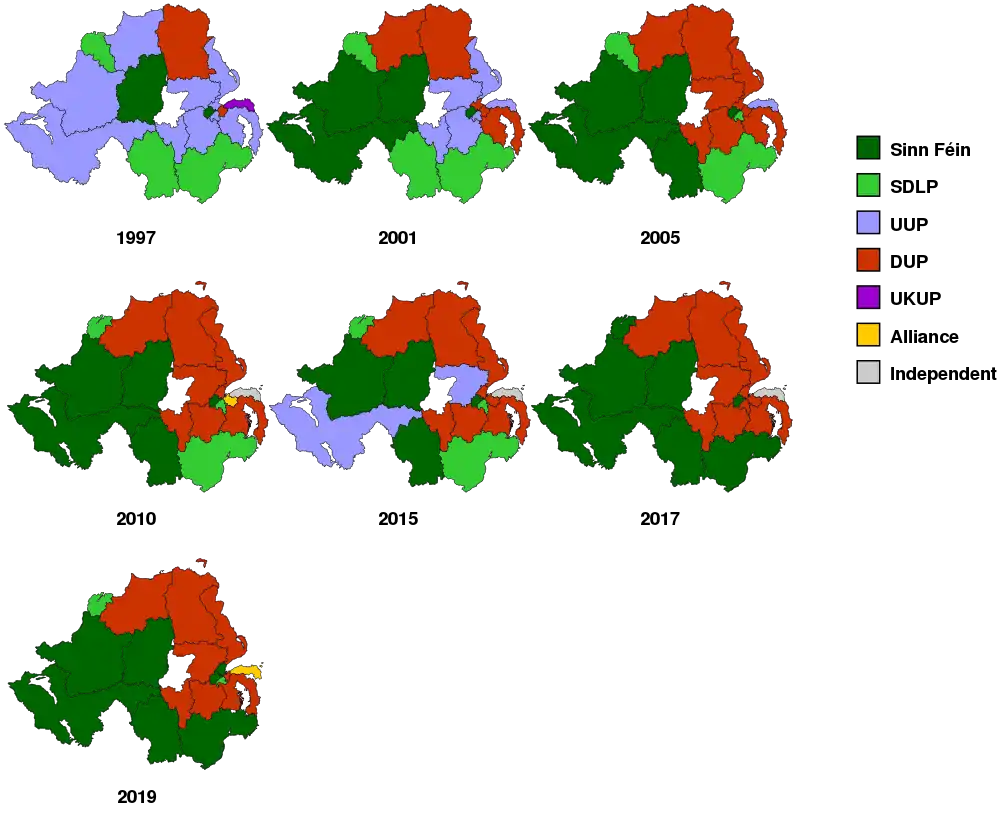
| Election | House of Commons | Leader | Votes | Seats | Position | Government | ||
|---|---|---|---|---|---|---|---|---|
| No. | Share | No. | Change | |||||
| Feb 1974 | 46th | Gerry Fitt | 160,137 | 22.4% (in NI) 0.5% (in UK) |
1 / 12 |
Labour | ||
| Oct 1974 | 47th | 154,193 | 22.0% (in NI) 0.6% (in UK) |
1 / 12 |
Labour | |||
| 1979 | 48th | 126,325 | 18.2% (in NI) 0.4% (in UK) |
1 / 12 |
Conservative | |||
| 1983 | 49th | John Hume | 137,012 | 17.9% (in NI) 0.4% (in UK) |
1 / 17 |
Conservative | ||
| 1987 | 50th | 154,067 | 21.1% (in NI) 0.5% (in UK) |
3 / 17 |
Conservative | |||
| 1992 | 51st | 184,445 | 23.5% (in NI) 0.5% (in UK) |
4 / 17 |
Conservative | |||
| 1997 | 52nd | 190,814 | 24.1% (in NI) 0.6% (in UK) |
3 / 18 |
Labour | |||
| 2001 | 53rd | 169,865 | 21.0% (in NI) 0.6% (in UK) |
3 / 18 |
Labour | |||
| 2005 | 54th | Mark Durkan | 125,626 | 17.5% (in NI) 0.5% (in UK) |
3 / 18 |
Labour | ||
| 2010 | 55th | Margaret Ritchie | 110,970 | 16.5% (in NI) 0.4% (in UK) |
3 / 18 |
Conservative-Liberal Democrats | ||
| 2015 | 56th | Alasdair McDonnell | 99,809 | 13.9% (in NI) 0.3% (in UK) |
3 / 18 |
Conservative | ||
| 2017 | 57th | Colum Eastwood | 95,419 | 11.7% (in NI) 0.3% (in UK) |
0 / 18 |
Conservative (DUP confidence and supply) | ||
| 2019 | 58th | 118,737 | 14.9% (in NI) 0.4% (in UK) |
2 / 18 |
Conservative | |||
Local government elections
| Election | Leader | First Preference Votes | Seats | Position | ||
|---|---|---|---|---|---|---|
| No. | Share | No. | Change | |||
| 1973 | Gerry Fitt | 92,600 | 13.4% | 82 / 517 |
||
| 1977 | 114,775 | 20.6% | 113 / 526 |
|||
| 1981 | John Hume | 116,487 | 17.5% | 104 / 526 |
||
| 1985 | 113,967 | 17.8% | 102 / 565 |
|||
| 1989 | 129,557 | 21.0% | 121 / 565 |
|||
| 1993 | 136,760 | 22.0% | 127 / 582 |
|||
| 1997 | 130,387 | 21.0% | 120 / 575 |
|||
| 2001 | 153,424 | 19.0% | 117 / 582 |
|||
| 2005 | Mark Durkan | 121,991 | 17.4% | 101 / 582 |
||
| 2011 | Margaret Ritchie | 99,325 | 15.0% | 87 / 583 |
||
| 2014 | Alasdair McDonnell | 85,237 | 13.6% | 66 / 462 |
||
| 2019 | Colum Eastwood | 81,419 | 12.0% | 59 / 462 |
||
European elections
| Election | Leader | First Preference Votes | Seats | Position | ||
|---|---|---|---|---|---|---|
| No. | Share | No. | Change | |||
| 1979 | Gerry Fitt | 140,622 | 25.5% | 1 / 3 |
||
| 1984 | John Hume | 151,399 | 22.1% | 1 / 3 |
||
| 1989 | 136,335 | 25.0% | 1 / 3 |
|||
| 1994 | 161,992 | 28.9% | 1 / 3 |
|||
| 1999 | 190,731 | 28.1% | 1 / 3 |
|||
| 2004 | Mark Durkan | 87,559 | 15.9% | 0 / 3 |
||
| 2009 | 78,489 | 16.1% | 0 / 3 |
|||
| 2014 | Alasdair McDonnell | 81,594 | 13.0% | 0 / 3 |
||
| 2019 | Colum Eastwood | 78,589 | 13.7% | 0 / 3 |
||
See also
- Demography and politics of Northern Ireland
- Labour Party in Northern Ireland
References
- O'Toole, Matthew. "Páirtí Daonlathach Sóisialta agus an Lucht Oibre". Facebook. Retrieved 18 May 2022.
- Mullally, Una (12 January 2020). "The day the SDLP was formed 'in the spirit of optimism'". The Irish Times. Archived from the original on 19 February 2020. Retrieved 19 April 2020.
- "View registration – the Electoral Commission". Archived from the original on 1 September 2019. Retrieved 8 February 2019.
- Nordsieck, Wolfram (2017). "Northern Ireland/UK". Parties and Elections in Europe. Archived from the original on 7 November 2016. Retrieved 28 September 2018.
- "The Good Friday Agreement – SDLP". Archived from the original on 26 January 2014. Retrieved 6 February 2014.
- Driver, Stephen (2011). Understanding British Party Politics. Polity. p. 188. ISBN 978-0-7456-4078-5. Archived from the original on 27 May 2016. Retrieved 25 November 2015.
- Paul Dixon; Eamonn O'Kane (2014). Northern Ireland Since 1969. Routledge. p. 6. ISBN 978-1-317-86657-2. Archived from the original on 30 April 2016. Retrieved 25 November 2015.
- "Local Council Political Compositions". Open Council Date UK. 7 January 2018. Archived from the original on 30 September 2017. Retrieved 7 January 2018.
- "Social Democratic and Labour Party (SDLP) Northern Ireland". Archived from the original on 18 June 2010. Retrieved 26 December 2019.
- William Beattie Smith (2011). The British State and the Northern Ireland Crisis, 1969–73: From Violence to Power Sharing. US Institute of Peace Press. p. 117. ISBN 978-1-60127-067-2. Archived from the original on 30 May 2013. Retrieved 1 February 2013.
- Ari-Veikko Anttiroiko; Matti Mälkiä, eds. (2007). Encyclopedia of Digital Government. Idea Group Inc. p. 398. ISBN 978-1-59140-790-4. Archived from the original on 3 January 2014. Retrieved 18 July 2013.
- Katy Hayward; Catherine O'Donnell (2010). Political Discourse and Conflict Resolution: Debating Peace in Northern Ireland. Taylor & Francis. p. 89. ISBN 978-0-415-56628-5. Archived from the original on 30 May 2013. Retrieved 1 February 2013.
- Cathal McCall (2003). "Shifting Thresholds, Contested Meanings". In James Anderson; Liam O'Dowd; Thomas M. Wilson (eds.). Culture and Cooperation in Europe's Borderlands. Rodopi. p. 93. ISBN 978-90-420-1085-7. Archived from the original on 30 May 2013. Retrieved 1 February 2013.
- Jörg Neuheiser; Stefan Wolff (1 January 2004). Peace at Last?: The Impact of the Good Friday Agreement on Northern Ireland. Berghahn Books. p. 46. ISBN 978-1-57181-658-0. Archived from the original on 30 May 2013. Retrieved 26 September 2012.
- Murray, Gerard. (2005). Sinn Féin and the SDLP : from alienation to participation. Palgrave Macmillan. ISBN 1-4039-6860-8. OCLC 1131510536.
- "The Nobel Peace Prize 1998". NobelPrize.org. Archived from the original on 22 May 2020. Retrieved 18 May 2020.
- Whyte, Nicholas. "Northern Ireland Assembly Elections 1998". Northern Ireland Elections. ARK. Archived from the original on 8 March 2020. Retrieved 18 May 2020.
- "Trimble, Mallon elected leaders of N. Irish Assembly". CNN. 1 July 1998. Archived from the original on 24 September 2015. Retrieved 18 May 2020.
- McDonald, Henry (8 April 2007). "SDLP could unite with Fianna Fáil". The Guardian. London. Archived from the original on 18 May 2007. Retrieved 23 May 2010.
- "SDLP leader Ritchie rules out merger with Fianna Fáil". The Irish Times. 4 April 2010. Archived from the original on 1 February 2011. Retrieved 8 February 2011.
- "SDLP-Fianna Fail 'merger': Email sent to SDLP membership says 'continuing on as normal is not an option'". Derry Now. 4 January 2019. Archived from the original on 5 January 2019. Retrieved 5 January 2019.
- "SDLP members back Fianna Fáil partnership". BBC News. 9 February 2019. Archived from the original on 10 February 2019. Retrieved 11 February 2019.
- "Fianna Fail and SDLP announce joint partnership". Archived from the original on 25 January 2019. Retrieved 25 January 2019.
- "Claire Hanna quits SDLP assembly group". BBC News. 11 February 2019. Archived from the original on 12 February 2019. Retrieved 11 February 2019.
- "SDLP leader Colum Eastwood: 'Sinn Fein are focused on themselves and on securing jobs for their friends'". belfasttelegraph. ISSN 0307-1235. Retrieved 21 February 2022.
- David McCann [@@dmcbfs] (17 February 2022). ""The SDLP stands on its own two feet." Not that it's new but confirmation that the partnership with FF is dead in the water from the pro side of the SDLP" (Tweet). Retrieved 21 February 2022 – via Twitter.
- Correspondent, Aoife Moore Political (20 February 2022). "Future of SDLP Fianna Fáil alliance unclear". Irish Examiner. Retrieved 21 February 2022.
- Hughes, Brendan (10 February 2020). "The SDLP-Fianna Fáil partnership one year on: Historic change or quietly forgotten?". The Irish News. Retrieved 21 February 2022.
- Breen, Suzanne (28 September 2022). "SDLP ends three-year partnership with Fianna Fail as party examines poor Assembly election results". Belfast Telegraph. Retrieved 29 September 2022.
- "Gerry Fitt". RTÉ Archives. RTÉ. Archived from the original on 16 May 2020. Retrieved 18 May 2020.
- Andrew Madden (19 December 2019). "SDLP leader Colum Eastwood affirms allegiance to Queen 'under protest'". Belfast Telegraph. Archived from the original on 12 January 2020. Retrieved 18 May 2020.
- "See Irish Echo article". Archived from the original on 4 July 2006.
- "Thousands gather to remember war dead". The Belfast Telegraph. Archived from the original on 17 October 2012. Retrieved 20 December 2010.
- "CAIN: Symbols – Unionist and Loyalist". Cain.ulst.ac.uk. Archived from the original on 6 August 2011. Retrieved 4 August 2016.
- "SDLP Leader Ritchie to wear Poppy" Archived 4 January 2018 at the Wayback Machine, BBC News
- "Decision to wear poppy difficult for SDLP leader Margaret Ritchie" Archived 17 October 2012 at the Wayback Machine, The Belfast Telegraph
- "Ritchie's Poppy Move 'Is a major breakthrough'" The Newsletter
- "Margaret Ritchie: SDLP leader 'to face challenge'". BBC News. 27 July 2011. Archived from the original on 23 November 2018. Retrieved 21 June 2018.
- "Bird's Eye View Patsy McGlone's Leadership Strike", The Phoenix Magazine, 12 – 25 August 2011, pg 8
- "Alasdair McDonnellelected new SDLP leader". BBC News. 5 November 2011. Archived from the original on 5 November 2011. Retrieved 5 November 2011.
- "SDLP leadership: Colum Eastwood wins contest against Alasdair McDonnell". BBC News. 14 November 2015. Archived from the original on 14 November 2015. Retrieved 14 November 2015.
- "General election 2019: A simple guide to the SDLP". BBC News. 4 December 2019. Archived from the original on 22 June 2021. Retrieved 22 December 2020.
- "Building a New Ireland Together". Social Democratic and Labour Party. Retrieved 22 October 2021.
- Ferguson, Amanda. "Abortion in Northern Ireland: Where do the parties stand?". The Irish Times. Belfast. Retrieved 21 December 2021.
- "A Fairer Society". Social Democratic and Labour Party. Retrieved 21 December 2021.
- petebkr (9 April 2018). "SDLP reaffirms commitment to an Irish Language Act". Your MLA. Retrieved 22 December 2021.
- "Social Justice". Social Democratic and Labour Party. Retrieved 22 December 2021.
- "Welfare reform: SDLP 'cannot accommodate' welfare proposals". BBC News. 22 May 2015. Retrieved 22 December 2021.
- "SDLP launches 'Give it Back' campaign to retain £20 Universal Credit uplift". Social Democratic and Labour Party. Retrieved 22 December 2021.
- "SDLP MLA Colin McGrath: 'When I was 10 my sister died. She was 16 and was gone within two days'". belfasttelegraph. ISSN 0307-1235. Retrieved 22 December 2021.
- "Education". Social Democratic and Labour Party. Retrieved 22 December 2021.
- cassoscoop (16 June 2021). "Eastwood brings Climate and Green Bill to Westminster". Derry Daily. Retrieved 23 December 2021.
- "SDLP Leader announces changes to Front Bench Team". Social Democratic and Labour Party. Retrieved 18 October 2022.
- "Sinn Féin tops poll in Euro count-BBC News". 8 June 2009. Archived from the original on 18 May 2014. Retrieved 27 March 2010.
- "Northern Ireland Assembly Election Results 2022". BBC News. Retrieved 6 May 2022.
- Emerson, Newton (30 March 2007). "Deal with devil small price to pay to snub the snobs". Nuzhound. Archived from the original on 22 August 2016. Retrieved 4 August 2016.
- Patterson, Glenn (9 April 2008). "A consensus on crowing". The Guardian. Retrieved 29 September 2022.